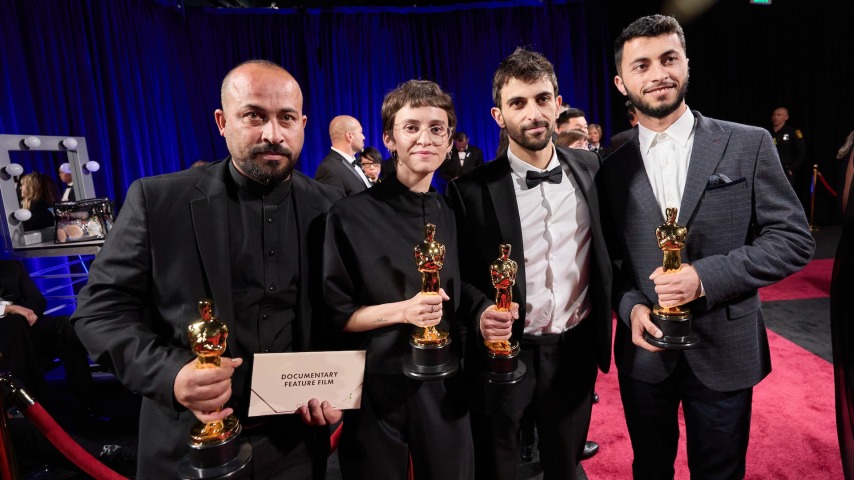Bill Kramer and Janet Yang”
It could be argued that Ballal’s “freedom to create, to challenge, and to imagine” was directly threatened by the violent attack of Israeli settlers and his subsequent detainment by Israeli soldiers, and that the Academy did not and still has not supported him in this. The organization had harsher language for Will Smith when he slapped Chris Rock (referred to in an Academy statement as a “deeply shocking, traumatic event to witness in-person and on television.”) After sharing the Academy’s letter on Twitter/X, Abraham invited readers to “compare this, which didn’t even name Hamdan, to the academy’s rightfully strong position when it’s the Iranian government oppressing filmmakers.” That statement, from 2011, reads:
“As an international organization representing over 6000 artists in 35 countries, the Academy of Motion Picture Arts and Sciences is deeply concerned whenever and wherever the rights of filmmakers are threatened. The recent arrest of six Iranian filmmakers, the sentence of “one year in jail and 90 lashes” to an actress just for playing a role in an acclaimed film, and the continued house arrest of Jafar Panahi, among others, is a situation that demands our serious attention. These filmmakers – and others – are artists, not political combatants. We join our colleagues around the world in calling unequivocally for these filmmakers’ safety, release, and return to filmmaking. They deserve the same, full freedom of expression that the overwhelming majority of our members enjoy every day, no matter where they are from, no matter where they work, no matter what their beliefs.”
While the Academy may have now developed an aversion to offering explicit and specific support to the Palestinian filmmaker they recently awarded an Oscar, other members of the international film community have spoken out about the situation. The International Documentary Association and the European Film Academy released statements calling for Ballal’s safe return before his release. Mark Ruffalo was among the most prominent Hollywood figures who spoke up for Ballal’s freedom, while many other artists and filmmakers— including Guy Pearce, Alex Gibney, Ezra Edelman, Fisher Stevens, Maya Rudolph, Ava DuVernay, Melissa Barrera, Christine Vachon, and many more—signed their names to a petition calling for Ballal’s safety and for the protection of the entire No Other Land team. And the Council On American-Islamic Relations (CAIR), the nation’s largest Muslim civil rights and advocacy organization, released a statement calling out the “hypocrisy” of the Academy, saying in part, “We call on the Oscars to stand on principle and, with specificity, condemn the violent attack on and kidnapping of Oscar winner Hamdan Ballal.”
Several critics’ groups also released their own statement of support for Ballal on Thursday. The statement reads:
“We, the members of the National Society of Film Critics, the New York Film Critics Circle, the Los Angeles Film Critics Association, and the Boston Society of Film Critics, express our support for the Palestinian filmmaker Hamdan Ballal and condemn, in the strongest terms, the brutal and unlawful attack he suffered this week at the hands of Israeli settlers, as well as his detainment by Israeli authorities. We are gravely concerned for Mr. Ballal’s health and safety, as well as the safety of his loved ones, and, now that he has been released, extend our hopes for his full recovery from his injuries.
Mr. Ballal was assaulted near his home in Khirbet Susya, a village in the Masafer Yatta region of the occupied West Bank. Attacks on the residents of Masafer Yatta are nothing new, as we have seen from “No Other Land,” the Academy Award-winning documentary that Mr. Ballal co-directed with Basel Adra, Yuval Abraham, and Rachel Szor. As critics representing four of the numerous organizations that honored “No Other Land” as the best documentary of 2024, we are infuriated that a filmmaker’s brave and principled advocacy has made him even more of a target in a community where Palestinians already exist under continual threat of displacement and violence.
One of the most powerful aspects of “No Other Land” — and the reason so many have tried, in vain, to limit its reach and silence its message — is that it is itself a rare feat of collaboration between Palestinian and Israeli journalists, activists, and artists, united by their belief in dignity and equality for all. By the very nature of its form and creation, the film represents, and dares to imagine, a more peaceful future. We applaud Mr. Ballal and his colleagues for the courage and artistry with which they have advanced that vision and affirm that it will never be forgotten.”
Hamdan Ballal has been freed following the attack on Monday, but both he and co-director Basel Adra have spoken out about increased violence in Masafer Yatta that feels like “revenge for our movie,” as Ballal put it. “They won’t stop here. The settlers will continue to attack us. I’m more scared now than before,” he told The Guardian. “After what they did to me. I fear it could now happen to others.” The IDF has denied Ballal’s claims that he was beaten while in custody, and said that he and two other Palestinian detainees were interrogated “on suspicion of rock hurling, property damage, and endangering regional security,” per The Los Angeles Times. The statement from an IDF spokesperson said, “The investigation is ongoing, and further arrests are expected.”

 Keep scrolling for more great stories.
Keep scrolling for more great stories.
